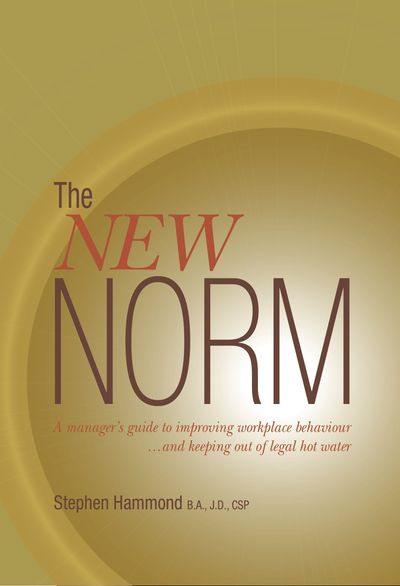Chapter twenty eight
THE NEW NORM is supportive of transgendered employees
Years ago I delivered training to police officers with the Vancouver Police Department (VPD). My two-hour session was part of a full day of professional development, and the person who spoke immediately after me was Roger Shakespeare, a detective with the department. Shakespeare was transitioning from being a man to a woman and in his session he spoke about transgender issues generally and his own process; he also answered questions.
When Shakespeare explained to management what he was about to go through, they called departments in the U.S. who had officers going through sex changes and those not taking a pro-active approach ended up being sued. They decided to be pro-active and supportive.
Shakespeare let me sit in on one of his sessions as I had no idea what transgendered people’s issues were. In a nutshell, I almost cried. The educational video he showed involving police and firefighters was very moving. However, listening to the story of his life and what he was going through was even more moving. I remember best his description: It felt like wearing your left glove on your right hand. He knew from an early age that he was in the wrong body.
Roger Shakespeare became Roz Shakespeare and she became quite the celebrity, with many stories and interviews in the media. After all, in Canada we aren’t used to seeing cops changing their sex. The police capitalized on Shakespeare’s profile by having her work with the Vancouver gay, lesbian, bisexual and transgender communities.
My contact at the VPD told me that sometime after Shakespeare’s session, in one of the department’s male locker rooms, one officer said to another, “How about Roger? What a fag.” The other officer replied, “Roger’s a friend of mine and a good detective. You might want to keep those comments to yourself.
It caught the “offending” officer off-guard, but also put him squarely in his place: That type of conversation wasn’t going to fly. The officer who defended Shakespeare acknowledged to my contact that prior to his training from Shakespeare, regardless of how he felt, he would have just gone along with the disparaging comment, likely adding something similar.
Shakespeare’s training and story goes back about twenty years, so presumably these days, most officers won’t hear anything like that off-hand comment in the locker room. We have come a long way. (Speaking of coming a long way, how many know that Canada recently appointed its first transgender judge, Kael McKenzie, in Manitoba effective December 17, 2015?)
If you want to know more about sex and gender discrimination, you might consider taking my Respectful Workplace online course. There are plenty of changes taking place to prevent harassment, discrimination and bullying at work.
However, the issue of transgendered human rights in Canada is just starting to “heat up.” His first day on the job, Canada’s new prime minister was asked why he’d made an effort to achieve gender parity in his cabinet. His response: “Because it’s 2015.” Although we can say that for many issues (note: update the year if you do), when it comes to the acceptance of transgendered people, not everyone is as progressive.
Yes, many provinces now include “gender identity” in their human rights legislation and most that don’t accept gender identity complaints under another category. It’s not universally protected in Canada (at the time of this writing), but it is being litigated in many different areas. Transgendered people have enjoyed some success, but still face a lot of challenges.
Human rights complaints and lawsuits within Canada include issues of gender identity on birth certificates, drivers’ licenses, student I.D. and passports. Complaints also involve parents with concerns about their children in school, particularly around the use of washrooms and educational curriculum. There’s still a long way to go, especially when you consider that most Canadians don’t understand what’s involved or why someone would go through such a transition.
However, despite the sad statistics surrounding suicide, drug and alcohol dependency, and abuse among transgendered people, the good news, based on research, is that when trans people get support from their family and work environment, the negative aspects of their lives are reduced considerably.
The OLD NORM
- thinks it’s awfully weird for someone to change their gender…Just keep it to yourself, thank you very much.
- isn’t interested in helping educate people in the workplace about a person transitioning from one gender to another, or changing one’s sexual identity.
- allows disparaging remarks from other employees to go unchecked.
- loses good employees or has to defend legal challenges due to workplace harassment or bullying.
The NEW NORM
- accepts that he may have a lot to learn about transgendered people and is open to learning.
- offers support to employees coming forward to explain a change in their sexual or gender identity.
- is proactive, educating employees about transgendered people when a transgendered employee comes forward (or perhaps not even waiting till then).
- won’t tolerate negative or disparaging comments or jokes about transgendered people.
Suggestions for the New Norm:
01
Relax. I have to confess that I stole this word from a transgendered person in a Canadian news story. It made such good sense. Since this is an area most people don’t completely understand, it’s easy to get emotional. Most of us aren’t used to transgendered people in our work or social circles, so we aren’t familiar with the issues or requests. If a person comes to you explaining there will be a sexual transformation of some kind, first, just relax.
02
Ask thoughtful questions. When you’re talking to someone at work who’s telling you about some gender or identity change they are or will be going through, ask questions such as, “What would you like me to know?” “What do you want others to know?” or “How can I/we help?” We may have preconceived ideas that can be changed with knowing the facts.
03
Don’t just sit back. Like the VPD many years ago, be proactive. Of course, if there’s a trans employee who can offer education or information, get this employee involved, with permission. Also, put a stop to any sign of harassment or inappropriate comments.
This chapter lets you know that sexual minorities are often in need of protection at work. For another example where people aren’t keeping up with changes at work, consider reading
Chapter 25: The New Norm doesn’t catcall women (honestly?).
Purchase a copy of The New Norm, or if you think all your supervisors and managers, could learn many valuable lessons about creating a respectful workplace, free of harassment, bullying and discrimination, you can get volume discounts.
What one reader has to say about Stephen’s book, The New Norm
“Stephen’s book is a brilliant reminder of workplace situations that are disturbing, yet slip by unaddressed by so many in both the private and public sector. When these behaviours are unaddressed, they become the norm because we allow them to be.
Just like his first book, Stephen is insightful, his writing is moving and he inspires his readers to take immediate action to disapprove of, and address harassment and other inappropriate behaviour every time we see it, feel it and hear about it. In a concise format, he gives us a series of snapshots of old vs. new, acceptable vs. unacceptable, right vs. wrong, in a way that is understandable.
If workplace leaders take just some of Stephen’s practical advice, they will go a long way to rid their workplace of unacceptable behaviours such as harassment, discrimination and bullying. It’s clear that to create Stephen’s “New Norm,” we need to ACT NOW! We can’t wait any longer.”
Tatjana Zatezalo
Manager, Organizational Development, Halifax Regional Municipality

Respectful Workplace Online Training Course
If you, your employees or your managers want more information,
sign up for my new online training course:
The Respectful Workplace in Canada.
With 10 modules of useful, relevant and current information,
this course can help everyone at your workplace.
This may be the best online harassment training your people will get.
Stephen Hammond is a lawyer turned speaker and consultant in the field of harassment, sexual harassment, bullying and discrimination at work.
The New Norm is Stephen’s third book.
Here’s more information about Stephen.



